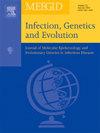小儿急性呼吸道感染呼吸道合胞病毒的遗传进化:来自非流行季节的见解
IF 2.6
4区 医学
Q3 INFECTIOUS DISEASES
引用次数: 0
摘要
呼吸道合胞病毒(RSV)是儿童急性呼吸道感染(ARI)的一个重要原因,最近的疫情增加了全球负担。2021年6月至8月的病例显著增加,可能是由于COVID-19控制措施。RSV-G区域造成显著的毒株变异,可导致严重的流行病。了解RSV遗传多样性对流行和疾病严重程度的影响对预防和管理至关重要。本研究旨在探讨RSV- g的基因组特征,为RSV疫苗的研制和控制提供参考。方法选取2021年5月至7月住院的74例急性呼吸道感染病例。采集鼻咽拭子标本,采用RT-qPCR检测RSV-A和RSV-B。g基因扩增、测序和比对进行遗传分析。构建系统发育树,并进行全基因组测序。结果74例病例中,1岁以下婴幼儿占35.1%,重症呼吸道合胞病毒感染占6.76%。RSVA占56.76%,RSVB占43.24%。观察到独特的突变,可能与流行趋势和疾病严重程度有关。系统发育分析显示与参考菌株存在显著差异,特别是在RSV-A - G蛋白中与疾病严重程度相关的三个氨基酸位点的独特组合。结论本研究揭示了深圳市2021年RSV淡季流行期间RSV的遗传多样性,并揭示了一个新的系统发育亚系的出现。了解RSV的遗传多样性对于开发有效的疫苗和控制RSV暴发至关重要。本文章由计算机程序翻译,如有差异,请以英文原文为准。
Genetic evolution of respiratory syncytial virus in pediatric acute respiratory infections: Insights from a non-epidemic season
Background
Respiratory syncytial virus (RSV) is an important cause of acute respiratory infections (ARI) in children, with recent outbreaks increasing the global burden. The 2021 season saw a significant increase in cases from June to August, possibly due to COVID-19 control measures. The RSV-G region contributes to significant strain variation that can lead to severe epidemics. Understanding the impact of RSV genetic diversity on epidemics and disease severity is critical for prevention and management. This study aimed to investigate the genomic characteristics of RSV-G and provide insights for vaccine development and RSV control.
Methods
Seventy-four hospitalized ARI cases were identified from May to July 2021. Nasopharyngeal swab samples were collected for RSV-A and RSV-B detection by RT-qPCR. G-gene amplification, sequencing, and alignment were performed for genetic analysis. Phylogenetic trees were constructed, and whole genome sequencing was performed.
Results
Of the 74 cases, 35.1 % were infants under 1 year old, and 6.76 % were severe RSV infections. RSVA accounted for 56.76 % of cases, while RSVB accounted for 43.24 %. Unique mutations were observed, possibly related to epidemic trends and disease severity. Phylogenetic analysis revealed significant differences from reference strains, particularly in a unique combination of three amino acid sites in the RSV-A G protein associated with disease severity.
Conclusions
This study provides insights into the genetic diversity of RSV during the 2021 off-season epidemic in Shenzhen and reveals the emergence of a new phylogenetic sublineage. Understanding the genetic diversity of RSV is critical for developing effective vaccines and controlling RSV outbreaks.
求助全文
通过发布文献求助,成功后即可免费获取论文全文。
去求助
来源期刊

Infection Genetics and Evolution
医学-传染病学
CiteScore
8.40
自引率
0.00%
发文量
215
审稿时长
82 days
期刊介绍:
(aka Journal of Molecular Epidemiology and Evolutionary Genetics of Infectious Diseases -- MEEGID)
Infectious diseases constitute one of the main challenges to medical science in the coming century. The impressive development of molecular megatechnologies and of bioinformatics have greatly increased our knowledge of the evolution, transmission and pathogenicity of infectious diseases. Research has shown that host susceptibility to many infectious diseases has a genetic basis. Furthermore, much is now known on the molecular epidemiology, evolution and virulence of pathogenic agents, as well as their resistance to drugs, vaccines, and antibiotics. Equally, research on the genetics of disease vectors has greatly improved our understanding of their systematics, has increased our capacity to identify target populations for control or intervention, and has provided detailed information on the mechanisms of insecticide resistance.
However, the genetics and evolutionary biology of hosts, pathogens and vectors have tended to develop as three separate fields of research. This artificial compartmentalisation is of concern due to our growing appreciation of the strong co-evolutionary interactions among hosts, pathogens and vectors.
Infection, Genetics and Evolution and its companion congress [MEEGID](http://www.meegidconference.com/) (for Molecular Epidemiology and Evolutionary Genetics of Infectious Diseases) are the main forum acting for the cross-fertilization between evolutionary science and biomedical research on infectious diseases.
Infection, Genetics and Evolution is the only journal that welcomes articles dealing with the genetics and evolutionary biology of hosts, pathogens and vectors, and coevolution processes among them in relation to infection and disease manifestation. All infectious models enter the scope of the journal, including pathogens of humans, animals and plants, either parasites, fungi, bacteria, viruses or prions. The journal welcomes articles dealing with genetics, population genetics, genomics, postgenomics, gene expression, evolutionary biology, population dynamics, mathematical modeling and bioinformatics. We also provide many author benefits, such as free PDFs, a liberal copyright policy, special discounts on Elsevier publications and much more. Please click here for more information on our author services .
 求助内容:
求助内容: 应助结果提醒方式:
应助结果提醒方式:


